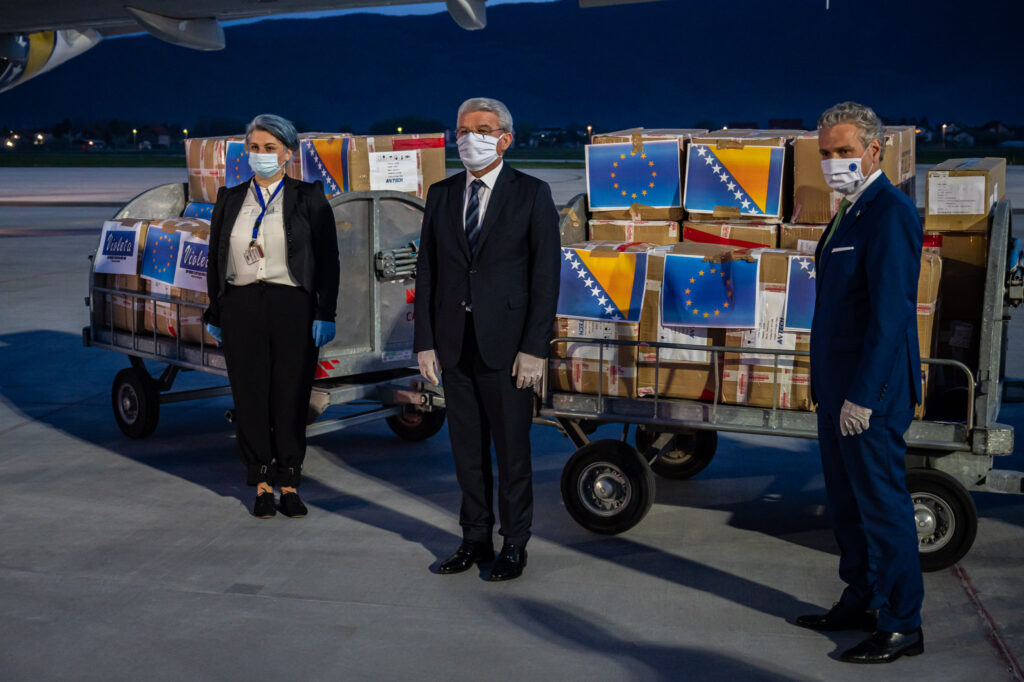COVID-19 in Bosnia and Herzegovina: games without borders?
*This blog is published as part of the regional blogging initiative “Tales from the Region” on the experience of western Balkan countries with the COVID-19 Pandemic, published between 24 June 2020 and 6 July 2020. The initiative is coordinated by Res Publica (North Macedonia), in partnership with the Institute for Democracy and Mediation (Albania), Analiziraj.ba (BiH), KIM Radio (Kosovo), Sbunker (Kosovo) the civic initiative „Ne Davimo Beograd“ (Serbia) and PCNEN (Montenegro).
Author: Mersiha Drinjaković
How did Bosnia and Herzegovina cope and how is it still coping with the crisis caused by the pandemic? Why didn’t we have a singular state-level crisis headquarters? How were the scandals produced, caused by irregularities and abuse of the system thanks to shortened procedures during the state of emergency? What caused our greatest fears? Will the November elections bring about change, at least at the local level?
Do you remember Game without Borders (the original name was Jeux sans frontieres), that fun show in which the contestants tried to overcome obstacles in an often-funny way? Competitors from 20 countries took part in the Games without Borders between 1965 and 1999, and the curious thing was that the Italian team participated in every show, and Germany was a whopping six-time winner. Why are we bringing up Games without Borders in this context? Well, because in Bosnia and Herzegovina – since the middle of March, we have been involved, not of our own volition, in a show with a similar concept – transformed into real life. Except it’s not fun and there are no medals for participants.
Terrified of the virus
When the coronavirus pandemic came to our neck of the woods, we were already frightened by the images, mostly those from Italy, and it was not difficult to convince us of the conditions of isolation, distancing, and strict restrictive measures. Borders were closed, classes in primary and secondary schools were suspended, as well as lectures at universities, hotels and restaurants were closed as well as all businesses in the service chain, only pharmacies and grocery stores remained open, with strict precautions. Yes, we were afraid and our fear was only partly based on the news of the terrible virus. The fear was based more on the state of our health care system – that is, the scenario in which we could find ourselves under its protection.
The virus was the enemy (and still is) and the devastated country with its debased inhabitants was perhaps the weakest link in the European chain of the fight against COVID 19. Why? When a virus attacks a weakened organism, it wreaks havoc in it – and COVID 19 could have caused a breakdown of the B&H health system, which for years was left to the arbitrary actions of political division of spoils after the elections: all healthcare institutions, starting from ministries, public health institutes to hospitals led mostly by people chosen by suitability, not by ability. The healthcare system has thus been weakened on several grounds: trained staff leaving (which has been going on for years), poor managerial assessments, procurement of medical equipment that was to the detriment of patients and for the benefit of suppliers and those who ordered the equipment. There has been a pile-up of imprudent and wasteful actions of our “managers at all levels”, not only from the health sector, and in March the consequences reared their ugly head, so of course, we were scared. Everything we heard from the people around us came down to the same thing – let’s just hope we don’t end up in the hospital.
Respirator procurement scandal
The period of the past three months of the pandemic was an important experience, I just don’t know if we can also call it a lesson. While the countries of the region were more or less fighting the virus, we were facing scandals. Shortened and urgent procedures for procuring items that are in high demand worldwide, such as respirators and protective equipment, posed an opportunity in B&H to dispose of taxpayers’ money in ways that are neither professional nor trustworthy. The first story that broke out on procurement by, to say the least, suspicious procedures, shined a light on Srebrena Malina, a company that deals with trading raspberries, and which was given the opportunity to order special respirators from China and had the money (about 5 million euros) paid in advance. The details of the contract became known to the public thanks to local media. Bosnia and Herzegovina’s Games without Borders really didn’t have any borders. The media put together a mosaic of scandals, bad moves by institutions, or, at the very least, measures and decisions that ran counter to logic on a daily basis.
Movement restrictions were introduced for persons under 18 and over 65, without providing any support for the elderly, who were left to the care of younger neighbours and volunteers who rose to the opportunity to take the long-vacant role of a responsible state whose purpose is to serve citizens. Then, on April 24, an amended decision came into force, which “allows the elderly over the age of 65 to move, on Mondays, Wednesdays and Fridays from 9 AM to 1 PM. Younger people under the age of 18 are also allowed movement, on Tuesdays, Thursdays and Saturdays from 2 PM to 8 PM. ”
The media, in most cases, reported responsibly, emphasizing the measures prescribed by the media industry and the competent crisis headquarters, with constant messages to “stay home”. Several journalists from the media who published stories on irregularities such as the purchase of overpriced masks, or stories indicating that the procurement of such protective equipment was supplied by companies that don’t deal with that type of business and who questioned the decisions and measures taken by the authorities during the pandemic, suffered and continue to suffer pressure (visible and invisible) such as journalist Arijana Saračević Helać who publicized documents according to which B&H lawyer Kadrija Kolić was on his way to sell a multi-purpose vehicle worth a million KM to the Sarajevo Canton’s Ministry of Interior.
A day later, Mr. Kolić called her a fraud and a liar, emphasizing that it was not him, but the company that he co-owns. A journalist from the web-portal Fokus, Semira Degirmendžić, who triggered an avalanche of events related to the procurement of respirators from China through the company Srebrna malina, was also made a mark. The web portal’s editorial staff issued a statement stating: “A campaign has been launched on several anonymous Facebook pages and accounts. the goal of which is to discredit Fokus and our journalist Semira Degirmendžić, and to indicate a connection with political options and individuals. According to what can be seen and analyzed from previous posts, it is a network of bots and sites that can be brought into direct contact with the ruling political structures.”
Non-unified crisis headquarters
The crisis underscored the countries complicated competencies: we did not have a single state-wide crisis headquarters, instead everyone prescribed measures at their own discretion, at the entity and cantonal levels. A member of the B&H Presidency from the Serb people has tailored measures in the Republika Srpska entity, although it is not in his jurisdiction, and in the Federation of B&H fragmentation of powers and decentralization has left residents in complete confusion in terms of how to respect measures and restrictions when moving from one place to another with different regulations and prohibitions.
The web-portal Klix published an article on various measures for the population in small areas of B&H, for instance in two settlements Dobrinja and East Sarajevo: “What is absurd is that only a hundred meters from East Sarajevo (RS), in the settlement Dobrinja in the Federation B&H, citizens are allowed to move during the weekend, except during curfew from 8 pm to 5 am. On the other hand, parents walking the streets of East Sarajevo with their children point to another absurdity and inconsistency in the measures of entities’ crisis headquarters. While children in Dobrinja can only watch the parks from their windows, their peers in East Sarajevo can at least walk through them.”
Journalists started asking questions, which, most often, were not answered, and it was difficult to get statements, because the press conferences of the representatives of the crisis headquarters took place without the presence of media representatives, due to regulations banning gatherings. The pre-submitted journalist questions could then be answered according to the concept – “we will choose what we will answer today”. The Media.ba web portal reported on that in detail: “Three journalists can attend press conferences of the FB&H Crisis Headquarters, and the names are delegated by the journalistic community mainly through a group on Viber. Conferences are held at 12 o’clock when the public is informed about the epidemiological situation, and it is mostly done by employees of the Federal Institute of Public Health and Assistant Federal Minister of Health Goran Cherkez. An afternoon press conference at 5:15 p.m. is also open to three reporters. The speakers are economists and during that period, economic measures are communicated. Journalists who do not attend press conferences must send questions by e-mail two hours before the start.”
A new blow followed very quickly: layoffs, mostly in the service sector but also in the field of small businesses, so the consequences of the measures on the country’s economy were terrible in the first weeks of the pandemic. The labour market was (and still is) on the verge of collapse, and estimates say that almost 30,000 workers have lost their jobs in FBiH since March, and about 2,000 in RS. Although mechanisms have been put in place to mitigate the negative effects of the crisis, they have been insufficient and measures have been implemented very slowly.

For example, it was not known for nearly two months whether the IMF-approved loan arrangement of 330m euros would become active at all – because local political leaders could not agree on how the funds would be distributed among the entities and cantons. An agreement was reached, with the mediation of EU and IMF officials. The FB&H government has adopted a set of measures, but little has been applied in practice so far. The Business Magazine web portal has compiled an overview of the most efficient intervention measures, citing a statement by Vjekoslav Vukovic, president of the B&H Foreign Trade Chamber (FTC), who says that the real economic challenges are yet to come. “Packages of fiscal measures of both entities are aimed at helping the real sector and the population, but on the other hand, an inevitable consequence is the growth of public debt… Clear criteria and a precise program of packages of measures must exist because a foggy situation helps the individual, not the economy.”
According to a report of the Konrad Adenauer Stiftung office in B&H, B&H’s borders were reopened on June 1st, after being closed for two months, however, when it comes to airports, for instance, the number of available flights and destinations is still low. The report on the situation in B&H also states that, after home isolation measures have been revoked, the “cancellation of the state of emergency, i.e. the state of disaster in the entities, followed, and once again they did not align the mitigation of measures, followed by the opening of borders.”
A heavy blow from the pandemic
According to current data (which changes from day to day) in Bosnia and Herzegovina, 168 people died from the Covid-19 virus, more than 2,200 recovered, and the number of infected is currently 3,633. Two and a half months of strict bans kept the epidemiological state stable to an extent. In the past few weeks, the measures were loosened and the citizens interpreted that as: there is no more virus, and the number of infected persons suddenly began to rise.
There will be municipal elections in November in Bosnia and Herzegovina. Although planned for October, they have been postponed to November 15th due to funding difficulties, or, consequently, the non-adoption of a budget that should provide funds for the election process. However, in mid-June, the budget for 2020 was adopted and 4.2 million KM was set aside for the elections scheduled for November.
This country has had a hard time withstanding the blow of the pandemic, shaken by years of abuse of the system by corrupt government officials, who, for their own benefit, annulled the functions of the system – needed as a service to citizens, and in fact used for decades by a mechanism of big or small services to whoever is suitable, as a tool to ensure electoral support. It is difficult to foresee how B&H will look in November (even if it is local elections) – whether there will be at least a partial change in the balance of political forces.
With the inevitable remark that elected representatives of the government should, through responsible action, genuine work and commitment, restore citizens’ trust in the system (which seems utopian, but it is possible), it is important to note that we ourselves must act more responsibly and in accordance with recommendations and measures, because in the past month we have been living as if there is no virus, which, somewhat understandably, was a psychological reaction of people locked in their homes for two and a half months. In addition, fueling conspiracy theories is of no use to us, as it further weakens precautions, putting at risk people that might have serious health problems caused by the virus.
About the author: Mersiha Drinjakovic is a journalist and executive editor of Gracija magazine, and associate of the Analiziraj.ba portal. She completed her studies in journalism at the Faculty of Political Sciences in Sarajevo and obtained various additional educations in the USA, Malaysia, Germany and France. She has been a journalist for 20 years, during which she won several awards including the 2015 UNICEF Special Award for journalistic contribution to information, protection and promotion of children’s rights in Bosnia and Herzegovina, the UN Women 2017 Journalist Award for the best article on gender-based violence in the print media category, she was presented with a letter of thanks from the Helsinki Committee of BiH at the Competition for the best media story / reportage that promotes LGBT rights and culture in 2017 and in 2018, she was awarded the UN BiH recognition for her journalistic contribution to informing and promoting the Sustainable Development Goals in BiH.


